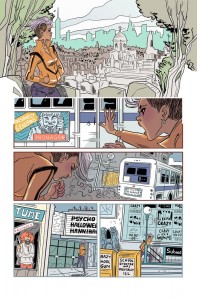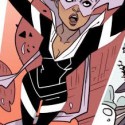In the past mental illness was largely misrepresented in the media, especially in the movies and comic book industry, where the villains were usually ones with mental illness. We know that someone with a history of mental (or physical illness) can be a superhero too and I’m glad that more films, TV shows, and comic books are now starting to demonstrate this point. In Iron Man 3, Tony Stark appears to have symptoms of posttraumatic stress disorder (PTSD) and while he is struggling, he is able to do what’s necessary to protect others. Similarly, in Gail Simone’s version of Batgirl, Barbara Gordon struggles with PTSD and her paraplegia due to the fact that Joker brutally shot her in The Killing Joke. And now there is a new hero with mental illness, Aura.
Aura has Bipolar Disorder, she has previously attempted suicide, and she suffers from horrific migraines, which for many people contribute to depression. Aura was written by a psychiatrist, Dr. Vasilis Pozios. I had the wonderful opportunity to interview Dr. Pozios about the comic book and its origins.
Superhero Therapy (ST): Can you please tell us a little bit about Aura?
Vasilis Pozios (VP): Aura is the eponymously titled short story featured in the forthcoming anti-bullying anthology, You Are Not Alone 2, from GrayHaven Comics. Aura is the superhero alter ego of a young woman named Alexis Pope who happens to have Bipolar Disorder and has survived a suicide attempt. Her superhero powers manifest through a sort of migraine with visual aura. In the story, Alexis’ musings about the stigma she’sfaced as a person with mental illness is juxtaposed against the prejudice and discrimination she encounters while commuting to her psychiatrist’s office.
ST: What made you pick a female character with Bipolar Disorder and migraines?
VP: This may sound cliche, but I didn’t pick Aura – she picked me. I knew I wanted to write a story dealing with mental health stigma, featuring a heroic character that happens to have a mental illness. Since entertainment media is a primary source of such stigma, I knew I wanted to include advertising as a way to visually represent that. I also wanted to show how interpersonal interactions might be impacted by prejudice and negative stereotypes related to having a mental illness, or even being perceived as having a mental illness. One way to illustrate those things was to depict someone walking down the street, riding the subway, encountering these different situations. And when I imagined that, I imagined Aura.
ST: Do you incorporate superheroes when you work with patients? If so, in what way?
VP: On occasion I do. Although I don’t treat children anymore, the opportunity to utilize superheroes presents itself more often now that superheroes have gone mainstream. For example, the other day, my patients watched The Avengers during a recreational therapy group. One of the most intuitive ways to work superheroes into treatment is when discussing responses to psychological trauma, since that is such an inherent aspect to most superhero origin stories.
ST: What are your hopes for Aura?
VP: I’d like as many people as possible to be entertained by Aura and hopefully be impacted in such a way as to be a little more mindful of how we treat people with mental illnesses.
ST: If readers want to read the comic, where can they find it and how can they contact you if they have any questions?
VP: Readers will be able to find Aura in the anti-bullying anthology, You Are Not Alone 2, from GrayHavenComics. The anthology will be available to order through GrayHaven’s website (www.grayhavencomics.com) later this fall. Readers can follow me on Twitter at @BTDocs and can email me at pozios@broadcastthought.com
ST: Dr. Pozios, thank you so much for writing this comic and for your endless work toward reducing stigma toward mental illness.
Below is a sample page from the comic (with the lettering removed), I highly recommend you check it out


I just love the idea & I hope it spreads! I’m bipolar. And I adore the idea that Aura’s peers come from her migraines. Something positive from something negative. . .I have an empathy that I think comes directly from mental illness, not psychic, but a sensitivity